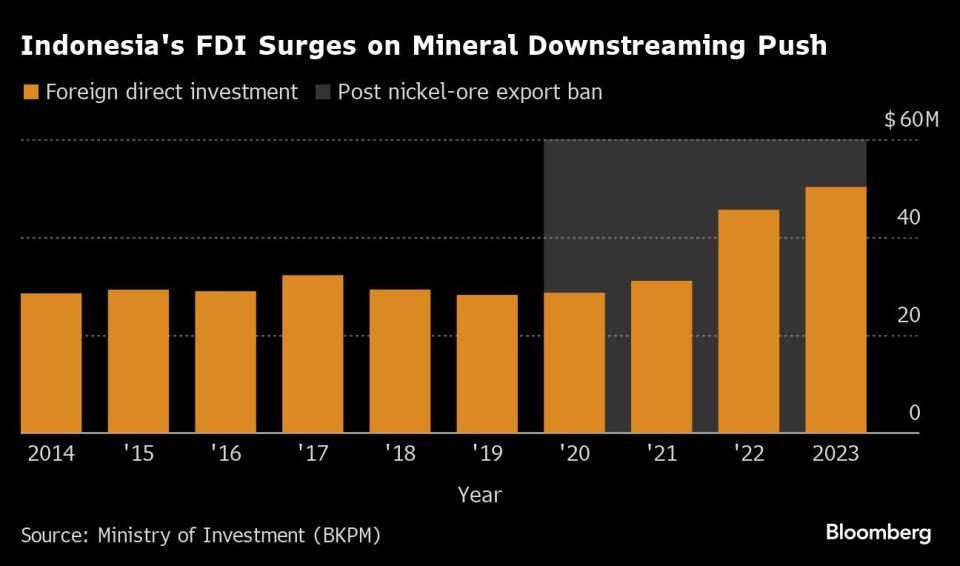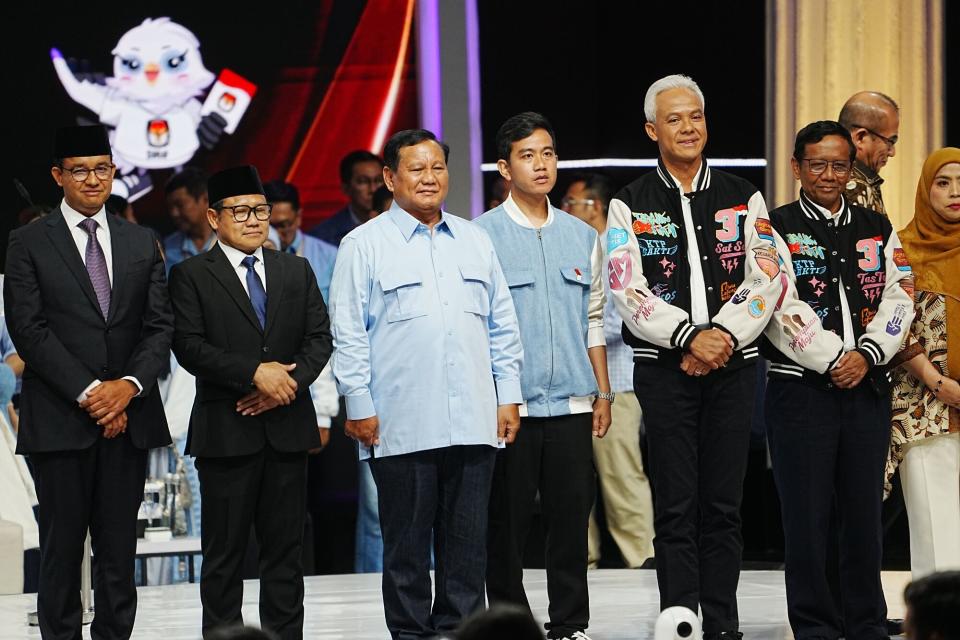Indonesia Counts Votes in Election to Define Post-Jokowi Era
(Bloomberg) -- Voting has finished in Indonesia’s election that has turned outgoing President Joko Widodo into a polarizing figure amid mounting backlash over moves to get his preferred successor in power to continue his policies.
Most Read from Bloomberg
Japan Loses Its Spot as World's Third-Largest Economy as It Slips Into Recession
Dip Buyers Wade Back In to Fuel Wall Street Gains: Markets Wrap
The world’s biggest single-day polls that took place over a six-hour period will also elect on Wednesday thousands of lawmakers to local and national legislatures. The new leadership to take over from Jokowi in October will help shape the policies that will chart investment and growth in Southeast Asia’s largest economy.
Running for president are Defense Minister Prabowo Subianto and former regional governors Ganjar Pranowo and Anies Baswedan in the first three-way race in 15 years. If no candidate secures the required threshold of 50% to win outright, Indonesia will head to a run-off election in June. A second-round voting last happened in 2004.
Unofficial quick count by private pollsters are expected to trickle in about two hours after voting closes in the west, while official results will take several weeks. The privately-run quick count will be based on snapshots of actual votes from more than 800,000 polling stations across the country. The margin of error depends on the sample size, though these polls have proven accurate in the past.
Polls opened at 7 a.m. Wednesday in the archipelago of more than 17,000 islands — stretching a distance similar to New York to Alaska. Voting ended by 1 p.m. local time, according to the election commission, with West Indonesia, including Jakarta, closing voting booths two hours after it ends in Papua. The world’s fourth-most populous nation with 205 million eligible voters has three time zones.
Heavy rains on Wednesday morning caused flooding and disrupted voting in 70 out of over 30,000 polling stations across Jakarta, according to data from the regional disaster management agency. Ballot boxes had to be secured on higher ground. Chairman of the General Election Commission Hasyim Asy’ari said affected polling stations can extend the voting schedule as long as ballots are available and volunteers report the event to the commission.
Boosting Exports
Indonesia’s next president inherits a $1-trillion economy that has fast risen in the global resource supply chain, thanks to Jokowi’s focus on overseas sale of refined rather than raw commodities. That move has boosted exports, narrowed the fiscal deficit and steadied the currency, making Indonesia an emerging-market favorite.
The popular Jokowi, however, has courted criticism throughout the campaign period. The older of his two sons became Prabowo’s running mate following a controversial constitutional court ruling presided by Jokowi’s brother-in-law. The incumbent leader’s attempt to extend his influence has also fractured his cabinet, with several ministers including his finance chief said to be mulling resignations.
A successor who will build on his reforms can attain 6%-7% growth, the fastest in three decades, Jokowi said last year. The goal to spur Indonesia’s gross domestic product beyond 5% was one that he failed to achieve during his 10-year rule.
The new president will lead a country that must create jobs for a large youth population while managing supply chain disruptions and the green transition that curbs reliance on locally-abundant coal. He must also navigate regional security concerns amid the heightening rivalry between the US and China.
The presidential contenders have mostly focused on themes of job creation, anti-corruption and economic growth. Prabowo and Ganjar — the latter backed by the ruling party — have largely pledged to continue Jokowi’s policies, such as accelerating infrastructure development, including the $34-billion new capital. Anies has positioned himself as an opposition candidate, seeking a review of Jokowi’s downstreaming push and the relocation of the new capital.
According to Alessandro Gazzini, who heads the Indonesia unit of consultancy Alvarez & Marsal, investors can be relatively assured of policy continuity as all three candidates have participated under Jokowi’s government, until recently. Even Anies will unlikely make any “revolutionary changes” to the national agenda, based on his track record, Gazzini told Bloomberg Television.
Markets are relatively calm ahead of the election, Commerzbank AG analysts including Charlie Lay wrote in a note to clients on Wednesday.
“They are not pricing in any surprises and expect a smooth outcome and transition of power. It may not come as early as today, but should be done and dusted by June,” it said.
--With assistance from Claire Jiao and Matthew Burgess.
(Updates with close of polls, flooding in Jakarta)
Most Read from Bloomberg Businessweek
The US Will Face Blowback in the Middle East, No Matter What
‘Playing God’: This Labor Activist’s Relentless Emails Force Companies to Change
It’s Not Love Generating Those Dating Reality Shows. It’s Money
©2024 Bloomberg L.P.




